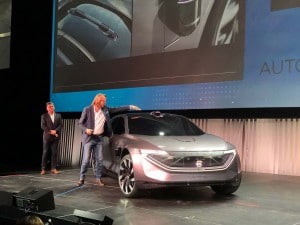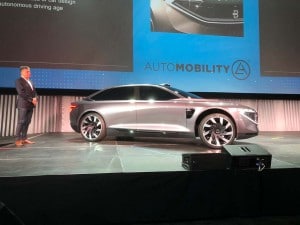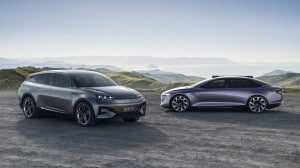
The global automotive market is in the midst of a revolution, something obvious to anyone attending this year’s Los Angeles Auto Show. Not only are we seeing a push into new technologies like electrification and autonomy, but the established carmakers are being taken on by a variety of automotive upstarts.
To a list that already includes the likes of Tesla, Faraday Future and Rivian, add China-based Byton. The company helped anchor the first day of previews at the L.A. Auto Show by unveiling a prototype of what it says will be its second new model, the K-Byte. But Byton officials also acknowledged that they still face challenges in their road to production.

The debut of the K-Byte follows Byton’s original prototype, the M-Byte, and targets a relatively mainstream buyer, at least by the standards of the electric vehicle market. According to Breitfeld, the sleek battery-sedan will come in at a starting price of around $45,000 when it comes to market. The target, at least, is to have it reach showrooms in China next year, followed by a late 2019 launch in the U.S., and a European roll-out in 2020.
But CEO Carsten Breitfeld was nothing if not cautious about outlining Byton’s ambitions, noting four hurdles that included the development of the vehicle, its underlying technology, and then paying for the company’s move into production.
(Byton looks to make a splash at Pebble Beach. Click Here for the story.)

“We need a lot of funding,” Breitfeld said, matter-of-factly, during Automobility, a special session focused on new technologies and vehicles, and the companies that are helping reshape the world of transportation.
The good news for Byton, Breitfeld added, is that it just completed a second round of fund-raising. Now, it is starting to move ahead with tooling up the factory it is building in Nanjing, China, a plant that he said will have the capacity to produce up to 300,000 vehicles annually.
Breitfeld might have added a fifth challenge, at least for its planned entry into the U.S. market. With China and the States locked in President Donald Trump’s trade war, Chinese auto imports currently are being saddled with 25% tariffs that would add more than $10,000 in added costs for Byton buyers. Whether that tariff will remain in effect by the time Byton is ready to enter the U.S. remains uncertain.
Whatever the ultimate price, the Byton K-Byte will offer buyers a sleek and luxuriously styled sedan, something design chief Benoit Jacob acknowledged goes against the grain as global markets rapidly migrate from passenger cars to SUVs and other light trucks.
(Click Here for more about Byton’s debut at CES this year.)
But, he suggested, the design “suggests a lot of habitability and space inside.” It also offers Byton the ability to target the K-Byte at commercial markets, as well as individual retail buyers. That appears to include ride-sharing services that would be drawn to the autonomous capabilities Byton plans to build into both the newer K-Byte, as well as its first model, the M-Byte.

The prototype unveiled in Los Angeles, notably, features a variety of different sensors needed for autonomous driving, including a “Li-Bow” element on its roof that incorporates front and rear-facing LIDAR, or high-resolution 3D lasers.
Another unusual design element is found on the car’s front end. Where you would normally find a conventional radiator there is a display screen that can be used to project a variety of images or even messages.
(Byton taking second Byte at the Apple with New Concept. Click Here for the story.)
There is no need for a conventional grille because the Byton K-Byte is all-electric. Company officials didn’t offer many details but did note they expect the production version to deliver around 250 miles between charges.







